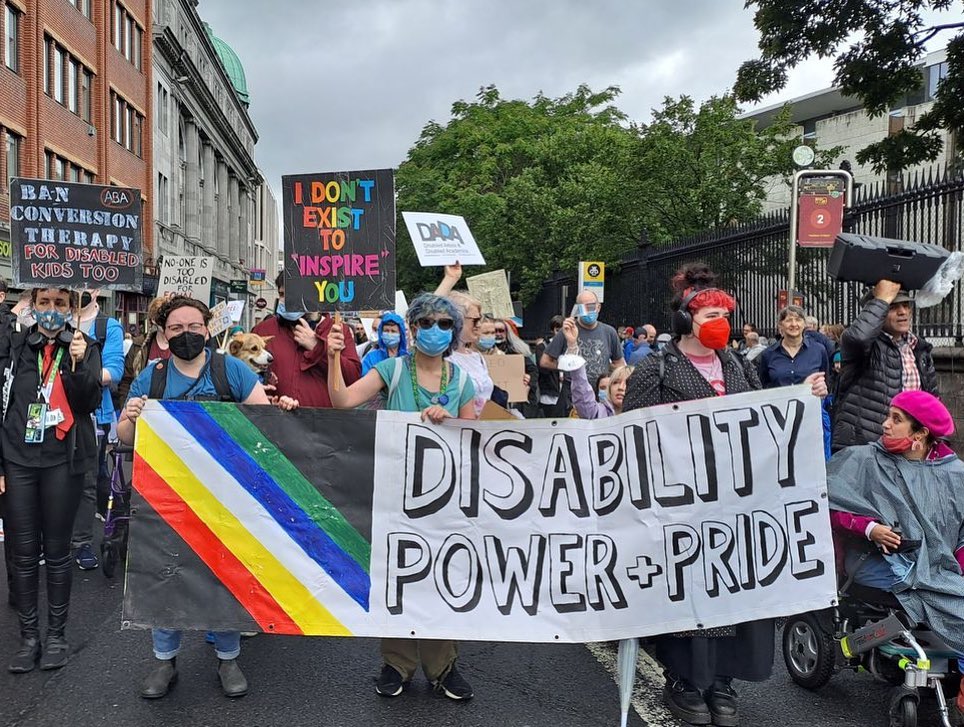Saturday, 20 July, saw Ireland’s first Disability Pride Parade march through Dublin. Organised by Disability Power Ireland as part of Disability Pride month, the parade saw hundreds participate in a march that was a “celebration of what it means to be disabled”.
The march took place on the same day as Chicago Disability Pride as a gesture of solidarity with the group. This year is the 20th anniversary of the first Chicago Disability Pride parade.
Key speakers spoke at the gates of the Dáil, with representation from the groups Disabled Women Ireland, Long Covid Advocacy Ireland, Full Spectrum Ireland, Neuro Pride Ireland, Access 4 All Ireland, Physical Impairment Ireland, Disabled Artists and Disabled Academics (DADA), Voice of Vision Impairment Ireland, and Gateway Mental Health Project.
Representatives from Disabled Person’s Organisations (DPOs) spoke on the need to increase the average amount of personal assistance hours for disabled people, which was most recently reported as amounting to an average of 42 minutes a week per person. This can make living an independent life, socialising, and working “impossible”.
Filmmaker Dan Airey cited that the lack of state funding for personal assistants hours means that “the culture around disability in Ireland is all wrong” and “inhumane”.
Speakers also noted that insufficient time with personal assistants excludes disabled people from meaningful community and workplace participation. Disabled Power Ireland expressed that providing personal assistants is “essential” for many disabled people to live an independent life.
Bernard Mulvany, an Access 4 All Ireland member, highlighted the material poverty many disabled people face due to inadequate state support. He said that “the pandemic payment of €350 per week was set at that rate because it was the lowest a person could live on. Yet the disability allowance is €220 [per week]”. In February, the Irish Examiner reported that the average Dublin rent is 2,300 euro per month.
Maryam Madani, activist and chairperson of Disability Power Ireland, told the Joint Oireachtas Committee on Disability Matters in June that “disabled people remain one of the most marginalised communities in Irish society, experiencing higher levels of poverty, unemployment, and social exclusion due to societal barriers which make it incredibly difficult for us to organise into DPO’s in the first place”.
The “charity-tragedy model of disability” that Madani criticised in front of the Oireachtas Committee in June was challenged at this event, with many participants sporting signs and t-shirts that read ‘Piss on Pity’ (a reference to a song of the same title which was performed after the speeches by two-man-band Acoustic Punk Advocacy Service). Madani spoke to Trinity News, stating how crucial it is that Disability Pride centres Disabled voices. “As a DPO, we are run and led entirely by disabled people, with space for allies, in order to challenge the domination of our sector by charities, service providers, and NGOs which do not hire enough of us in our own movement, and tend to undermine the lived experience, talents, and the capabilities of disabled people. We [Disability Pride Ireland] believe in disabled people and what we can do”.
Ross Coleman, an Irish language poet, playwright, and Trinity alumnus, gave a speech at the parade, stating that he “used to feel shame” in being disabled: “Then I realised that it was an ableist society that ingrained that feeling in me. Now I refuse to feel ashamed. It is the ableist society that we live in that should feel shame”.
Disability Power Ireland is a grassroots cross-impairment disabled person’s organisation. The group’s manifesto references goals to “build collective power and increase the participation of disabled people in society’ and ‘to advance the human rights of people with disability”. Following the Disability Pride Parade in Dublin, a Disability Pride Parade and Summer Party took place in Ennis, Clare, on Wednesday, July 26.






